

Publications Regarding Basic Law: The Knesset
Articles

Could Sderot Have the Same Standing as Tel Aviv? Perhaps If We Reform the Electoral System
Written By: Dr. Assaf Shapira, Prof. Gideon Rahat
Israel is the only OECD member that has neither regional elections nor a personal element in the electoral system. This is not simply a technical issue but has far-reaching implications relating to the quality of representation and the obligation elected officials have toward their voters.
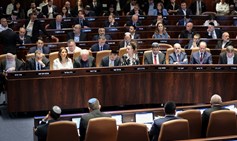
The Judicial Overhaul and Anti-Democratic Initiatives
Written By: Adv. Anat Thon Ashkenazy, Adv. Daphne Benvenisty
Judicial overhaul initiatives, along with other anti-democratic measures, have continued to be promoted by the government and the coalition in the Knesset. This document outlines the various actions taken in government that weaken the Israeli judiciary and democracy at large.
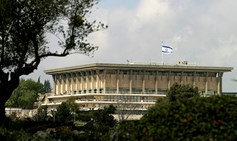
Don’t Call It a Comeback
Written By: Dr. Shany Mor
In mature democracies, parliaments are regaining their relevance in the coronavirus era.

Speaker of the Knesset's Resignation – What Happens Next?
Written By: Dr. Amir Fuchs
Speaker of the Knesset Yuli Edelstein has resigned so as not to comply with the Supreme Court ruling to hold elections for a new speaker - what happens next? IDI’s Dr. Amir Fuchs explains

Speaker of the Knesset's Resignation - Statement
Yohanan Plesner, President of the Israel Democracy Institute, reacted to the Speaker of the Knesset Yuli Edelstein's resignation
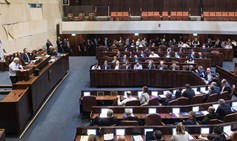
Parliaments Around the World
Written By: Dr. Chen Friedberg, Avital Friedman, Dr. Assaf Shapira, Dr. Shany Mor
As the Knesset struggles to resume its work, IDI took a look at how parliaments around the world are putting into place processes and mechanisms that enable them to operate during the coronavirus pandemic so they can fulfill the vital role they play in democracies.

The Functioning of the Knesset during the Coronavirus Emergency
Written By: Dr. Chen Friedberg, Avital Friedman, Dr. Assaf Shapira, Dr. Shany Mor
In this paper, we argue that in a public health emergency, such as the one we are experiencing now, when unprecedented means are being employed in the fight against COVID-19, the Knesset’s smooth functioning is even more essential, especially with regard to the need for strict and effective oversight of the government.

Convene the Knesset Plenum Without Delay - IDI Statement
IDI Statement to Knesset Speaker Yuli Edelstein: Convene the Knesset Plenum without delay; failure to do so blatantly exceeds the bounds of your office and constitutes an unacceptable disregard for basic rules of democracy

Incumbent Minority Governments
Written By: Prof. Ofer Kenig
Although there is no precedent in Israel's history for forming a minority government immediately after an election, minority governments around the world are far from a rarity.

All About Splits
Written By: Dr. Assaf Shapira
How can MKs 'cross the floor' and what sanctions might they face? An explainer by Dr. Assaf Shapira
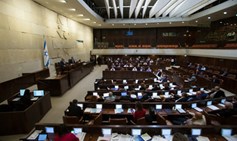
The Knesset is not a Sanctuary
Written By: Dr. Amir Fuchs
This claim was first put forth in a letter from the Knesset’s legal adviser, Eyal Yinon, to the speaker of the Knesset with regard to the situation of MK Haim Katz.
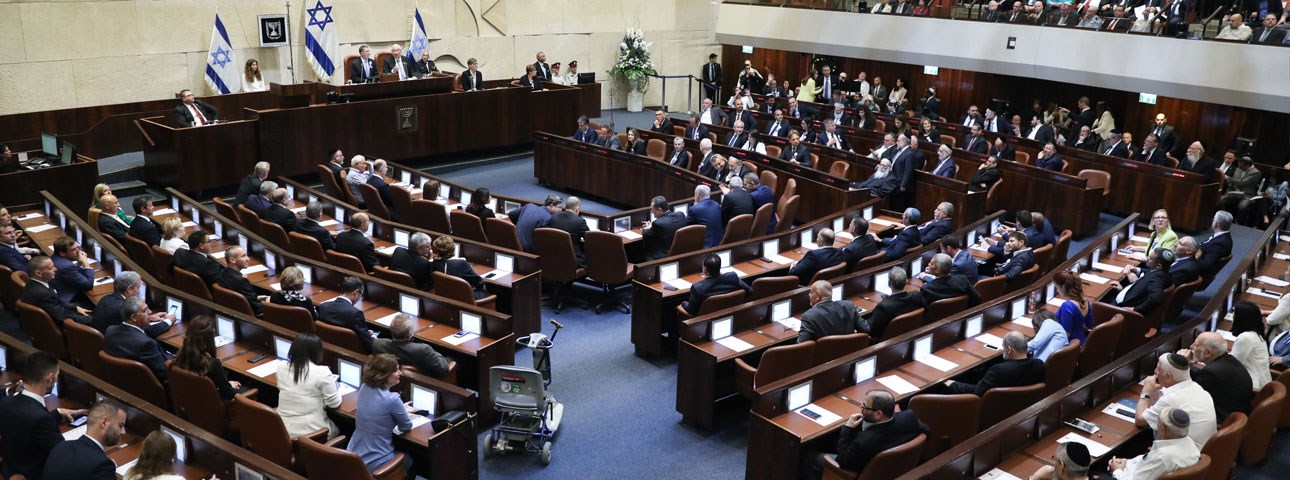
What will the new Knesset look like?
Written By: Prof. Ofer Kenig
All in all, the human landscape of the Knesset continues a trend of an improved representation, which better reflects the heterogenous Israeli society. Still, several groups are still under-represented, mainly women, non-Jews, young adults and “Russians”.

A Knesset in the Deep Freeze
Written By: Dr. Chen Friedberg
Those who are not familiar with the Knesset’s day-to-day activities may mistakenly believe that it normally functions efficiently.

Opinion: Repealing the Law to Dissolve the Knesset
Written By: Prof. Yuval Shany, Dr. Amir Fuchs, Dr. Guy Lurie, Prof. Ofer Kenig
An opinion submitted today (June 26th) to MKs, the Attorney General, and the Knesset Legal Advisor on behalf of the Israel Democracy Institute, opposes the proposal to repeal the law to dissolve the Knesset and seeks to take the proposal off the agenda.

Repealing Law to Dissolve the Knesset: Motivated by Personal Interests
Written By: Prof. Yuval Shany, Dr. Amir Fuchs, Dr. Guy Lurie, Prof. Ofer Kenig
The proposal promotes personal and political interests, strikes a severe blow to the public’s trust in democracy and to elected officials’ obligation to act with integrity

It’s time to change how we select Knesset candidates
Written By: Prof. Gideon Rahat
Primaries often don't reflect the true will of actual party supporters -- voters should weigh in on Election Day

Government Ministers to Vote on Bill to Override Supreme Court Decisions
Written By: Lahav Harkov | Jerusalem Post
The Prime Minister is currently fighting to remove the Supreme Court's power to strike down Knesset legislation, thereby turning the last protector of human rights in Israel into merely an advisory board. He is even threatening elections over the issue.

Knesset Proposal to Impose Sanctions on Non-Attendance at Parliamentary Committee Meetings:
IDI scholar recommends adopting a proposed amendment to Basic Law: The Knesset, aimed at penalizing Knesset committee members who are invited to testify or submit information but do not comply.

As MK Expulsion Bill is Brought for Third And Fourth Reading ...
Today, the MK Expulsion Bill will be brought to the Knesset plenum for its third and fourth reading. The bill is an amendment to the Basic Law on the Knesset, which will enable the expulsion of a legally elected MK from Knesset by a vote of 90 out of 120 MKs.

MK Suspension Bill: Anti-Democratic to the Core
Written By: Dr. Amir Fuchs
Last week, the Knesset Law, Constitution and Justice Committee began deliberating over a proposal that would fundamentally alter the Basic Law – The Knesset: The MK Suspension Bill. If passed, the proposed bill would grant members of Knesset the power to remove another parliamentarian. This op-ed originally appeared in the Jerusalem Post.

Israel Democracy Institute Scholars Ahead Of Monday's Vote On The MK Suspension Bill:
Ahead of tomorrow's expected first reading of the MK Suspension Bill on the Knesset floor, Israel Democracy Institute (IDI) scholars sent an updated policy statement to members of Knesset, calling on them to vote against the bill.

Legislative Solutions in Israel and America: Comparing Apples to Oranges
Written By: Dr. Amir Fuchs
The Knesset is currently considering a proposed amendment, sponsored by the Prime Minister, to Basic Law: The Knesset. It would allow a special majority of 90 Knesset members to suspend an MK for an unlimited period of time. In effect, this would be tantamount to an expulsion, with the suspended parliamentarian replaced by the next person on his or hers party’s candidates list. This article was first published by JNS.org.

IDI Scholars on the MK Suspension Bill: Unacceptable, Invites Political Witch Hunts
IDI researchers come out against MK suspension bill.

Women’s Representation in the Knesset: Is it Sufficient?
Written By: Prof. Ofer Kenig
The 19th Knesset is expected to have a record number of women MKs. Nonetheless, the percentage of women in the Knesset is lower than that found in the parliaments of most other established democracies. IDI researcher Dr. Ofer Kenig provides an overview of the situation.

Elections in the Shadow of War (2012)
Israel's launch of Operation "Pillar of Defense" just before the elections for the 19th Knesset is reminiscent of the launch of "Operation Cast Lead" before the elections of 2009. Should the elections be postponed? Dr. Dana Blander discusses elections during times of war, in Israel and abroad, from an historical-legal perspective.
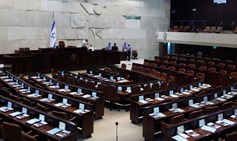
A Weak and Inefficient Knesset
Written By: Dr. Chen Friedberg
In a democracy, parliaments are supposed to not only pass laws but also engage in oversight; that is, to ensure that legislation is implemented and identify deficiencies in the government’s work.
